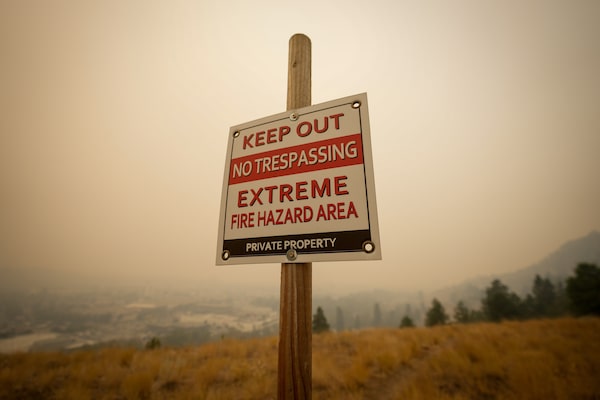
British Columbia's desperate battle against hundreds of wildfires continues on multiple fronts Sunday. A warning sign about fire risk is seen as smoke from wildfires fills the air, in Kelowna, B.C., on Aug. 19.DARRYL DYCK/The Canadian Press
Dave Sommer is vice-president for strategic communications with Enterprise Canada. He previously served as head of digital for Prime Minister Justin Trudeau, and as head of government and politics with Instagram in Washington, D.C.
As raging wildfires threatened the capital of the Northwest Territories, a social media post from the City of Yellowknife was astonishing in its uselessness.
Announcing an upcoming news conference on the fires, it wrote on X, formerly known as Twitter: “Due to the recent change in legislation, the City is unable to share the link because it’s a media source.” The city told people to manually type in a URL or try to search for it.
And that URL? It was simply the top-level, main domain: cpac.ca. Even when there, people interested in the news conference would still have to search the website itself for the event.
As useless as Yellowknife’s post was, it was also wrong. The “legislation” in question is Bill C-18, the Online News Act, which would force certain platforms to pay news outlets for links to their content. It has so far prompted Meta, which owns Facebook and Instagram, to block links to news.
But the thing is Twitter, as the platform is still informally known, is not subject to Bill C-18, and it has yet to comment on this or take any action whatsoever. In the top response to Yellowknife’s post, a user posted a link to the news conference without any problems.
That makes the City of Yellowknife’s post even more discouraging – a sign that governments are having increasing trouble trying to communicate with citizens on social media the way they used to.
In the early 2000s, the rise of social media revolutionized government communications, allowing politicians to bypass news media to speak directly to the people and control the messaging. Social media was a powerful tool.
Today, however, the online world has changed. Audiences are scattered and atomized between ever more platforms, whose black-box algorithms and constant policy changes make it harder to pierce through followers’ feeds.
Just take a look at this brave new world. Necessity has bred invention amid the actual news bans sparked by Bill C-18: News organizations in the Northwest Territories say their readers are relying on workarounds such as screenshots to share information on social media as critical channels have been shut off.
This is supremely unsustainable and leaves people deeply vulnerable to misinformation and the malicious actors, scammers and grifters who strike in times of crisis, such as during COVID-19.
As for Twitter, its new business model did away with what it called “legacy” account verifications, instead offering a blue check mark to anyone willing to pay a fee. Neither the City of Yellowknife nor the Government of the Northwest Territories are verified on Twitter – and even if they are, that holds little meaning.
Imagine what happens when governments share vital information and “verified” trolls post random contradictory or made-up garbage directly beneath it in the comment section. Which post is the most authoritative? Can the average user even tell?
The troubles at Meta and X are a perfect storm. As their environments are reshaped, they magnify just how hard it’s becoming for governments to communicate effectively on social media, especially in emergencies.
Meanwhile, the meteoric rise of TikTok has been great for countless creators and brands, but for governments in Canada, the U.S. and elsewhere, it’s a no-fly zone due to national security concerns over Chinese ownership, which basically kneecaps their ability to speak to a massively growing audience of Gen Z users.
Platform usage has also started to divide along cultural lines. This isn’t just exemplified by the former U.S. president Donald Trump’s use of Truth Social, but also platforms such as Reddit and Discord, where there are individual niches of communities.
What used to be primarily messaging apps like Telegram and WeChat have branched into social media. And WeChat is also an example of something else: It’s a platform largely specific to China, and it’s not alone. In Russia, for example, the dominant platform is called VK.
Then there is Instagram’s would-be Twitter killer, Threads, which is still without trending topics, hashtags or the ability to search by topic. Instagram chief Adam Mosseri said the platform wouldn’t limit political content, but would do nothing to encourage it.
Like many Twitter rivals, how successful Threads would be is uncertain, but its mere presence underscores the new state of the world: More people are online than ever before, yes, but the web has never been so splintered.
So what’s the solution? It’s hard to say. By a wide margin, younger generations still get their information from online sources first. Whether governments like it or not, this is an environment they need to continue operating in.
Provincial and local governments need to focus on building their social media followings before crisis strikes, offering interesting and relatable preparedness content that helps grow their audiences and build up a reservoir of trust for when things go south.
For example, the Washington State Department of Natural Resources has been addressing wildfire season exactly this way, setting the standard for how governments can renew their connection with citizens – posting engaging, relatable, plain-spoken content (and yes, memes) at a time when the novelty of seeing official sources online has worn off.
But such efforts can accomplish only so much. At its best, social media is a vital pipeline for authoritative information and a key source of community connection. At a time when those communities are scattered across the internet or worse, actively prevented from accessing important content, the future of that pipeline looks increasingly uncertain.